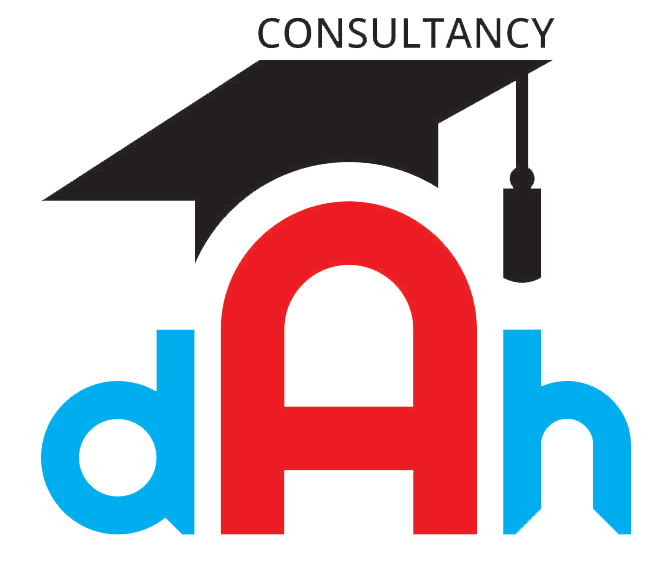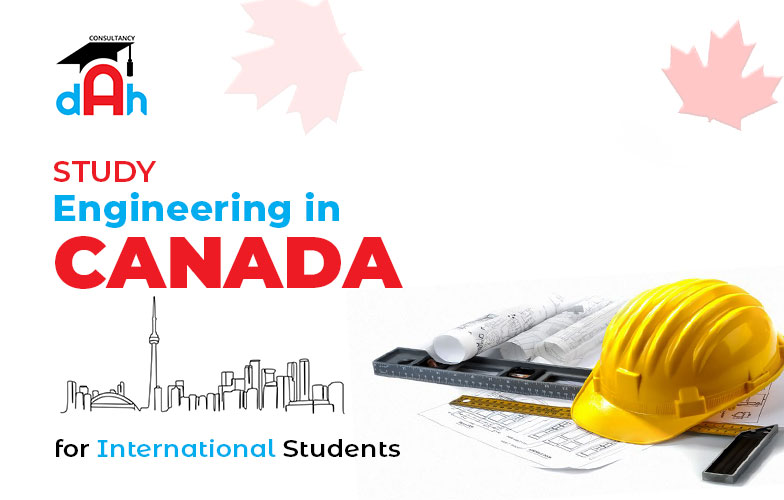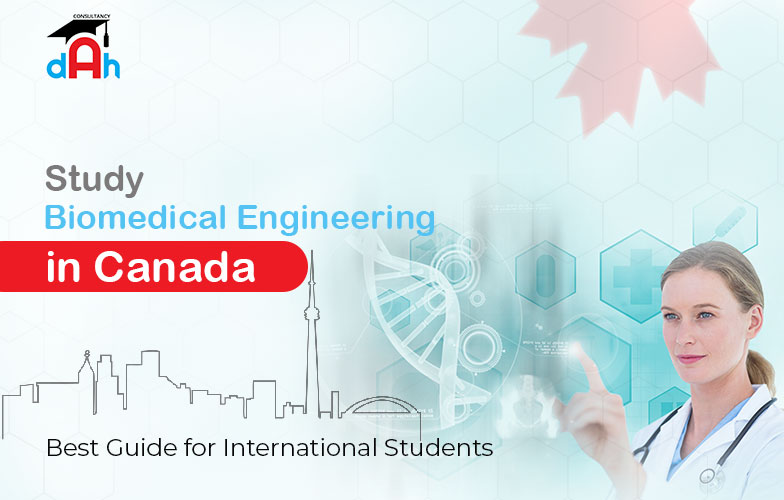Canada has become the land where dreams come true for many students. It consistently tops the list of the most desired destinations to live, work, and study. From the natural scenic beauty of Canada, and best health prospects to qualitative education, Canada has everything one wishes to live a better life.
Many Nepalese students seek to study abroad in Canada from Nepal for their higher education each year. Well, if you are planning to study in Canada from Nepal, then it might be one of your wise and best decisions so far. Choosing Canada as your study destination benefits you in every aspect possible. As Canada continues to provide a first-class education to students at affordable fees, it is an ideal country for higher studies.
Why to choose Canada for Study? Top Reasons to study in Canada from Nepal

No doubt that Canada is one of the top destinations for international students as well as immigrants because of its incredible amenities. It has managed to entice many foreign students over the decades. If you are searching for some convincing reasons to study in Canada, you don’t need to go very far.
Here are some of the top reasons to study in Canada from Nepal are listed below:
1. Higher Quality of Education:
Canada is widely known for its high quality of education. Education from Canadian Universities and Colleges is accepted and recognized globally. The degree certificate obtained from Canadian Education Institutions will help students to get better employment opportunities worldwide.
Canada has many of the top-ranked universities in the world. And students are taught by top educators. Educational institutions in Canada have designed courses in a way that focuses on both theoretical and practical knowledge.
2. Vibrant Campus Lifestyle
Canadian Universities and Colleges are also famous for their vibrant campus lifestyle. Life in Educational institutions in Canada is dynamic. They provide students an opportunity to grow, get involved in co-curricular activities, and make connections with people for self-development.
The vibrant campus lifestyle of Canada is an amazing trait for every student to have fun and refreshment while studying.
3. Affordable Fees
One of the topmost reasons to study in Canada for international students is the affordable fees of Canadian Universities and Colleges. The tuition fees and living expenses are lower in comparison to other English-speaking countries.
Moreover, there is a wide range of programs that students have options to choose according to their budget and interest.
4. Quality of life
Canada never fails to get ranked on the list of The World’s Best Country for Quality of Life. Students will be able to live a better quality of life along with a higher quality of education. More than an average percentage of people living in Canada are reported to be in good health.
The clean positive environment of Canada draws the attention of many immigrants and international students.
5. Live in a Diverse Community
There are many immigrants coming from different ethnicities, cultures, races, religions, and beliefs. It is no surprise that along with English and French ( which are two official languages), many languages are spoken in Canada. It is a multilingual country.
Students are often curious about discovering new things or gaining experiences. To live in a diverse environment, to learn new things, and to develop as an individual, Canada is the right country to look for.
6. Employment Opportunities
With the certificate in your hand from Canadian Education institutions, you will have an option of working in Canada as well as any other country. As degrees from Canadian colleges and Universities are valued by employers across the world. Also, the Canadian Government has a friendly attitude towards international students.
International students can live and work in Canada for a maximum period of 3 years after their graduation through a ‘Post-Study Work Permit’. It can be a good shot to develop and improve your professional skills staying in Canada.
7. Natural Beauty of Canada
Apart from technologies and great infrastructures, Canada is also one of the most beautiful countries naturally worldwide. Canada is more than a winter. It experiences all four kinds of weather (Summer, Winter, Spring, and Autumn). The natural beauty of Canada is beyond words.
Students can indulge themselves in the gorgeous landscapes of Canada when they want to get away from it all to rejuvenate their bodies and mind.
8. Research Opportunities
Canada is also best known for Research Works globally. Canada has an extensive number of research laboratories, firms, universities, and hospitals in collaboration. Most of the study programs in Canada offered by Canadian Universities and Colleges focus on research.
Students can get to engage in experiments and projects with access to the required tools. This will provide them with a better study experience and sharpen their innovation.
9. Work while you Study
International students are allowed to work on-campus as well as off-campus while studying in Canada. The Canadian government is considerate about the welfare of international students during their stay in Canada. They are allowed to work for 20 hours a week during their study. This will help them to ease their daily expenses.
International students are paid on an hourly basis in their job. With an average of $15 per hour, students are paid differently in all provinces in Canada. But to work in Canada or to have access to government programs and benefits, students need to have a Social Insurance Number (SIN). It is a nine-digit number issued to one person only.
Education System in Canada

Canada is the most educated country in the world with 56.27 percent of its adult population having earned a higher education. The Canadian government makes a larger investment in its education system. Also according to the Organization for Economic Co-operation and Development (OECD), Canada is one of the top three countries in spending per capita on public post-secondary education.
The post-secondary Education System of Canada is divided into
- Certificate Level: The study at this level is generally for a year.
- Diploma Level: The study at this level is for two or three years.
- Bachelor’s Degree: It is obtained after four years of full-time study.
- Post-graduate Diploma: It is one to two years of postgraduate qualification done after an undergraduate degree.
- Masters Degrees: It is done after a bachelor’s degree to excel in a specific subject for one to two years.
- Doctorate or Ph.D. : It takes four to seven years.
Generally, Canada offers three intakes for international students i.e. winter intake, summer intake, and fall intake.
Fall intake is known as the major intake for international students. It is in September when a lot of universities provide several course options to students. Winter intake occurs in January. It has fewer university and course options compared to Fall intake. And the summer intake takes place in May. It usually has very few university and course options.
Total Cost to Study in Canada from Nepal
The total cost to study in Canada from Nepal is a matter to discuss before applying for it. Although studying abroad is expensive, we need not fear it when it comes to Canada because Canada offers a quality education at the lowest tuition fees compared to other countries.

- Tuition Fees to study in Canada from Nepal
Tuition fees to study in Canada from Nepal depend on the type of course and institution you have chosen. It varies with different courses and educational institutions. You will need approximately CAD $13,000 to CAD $40,000 per year.
| Study Level | Average Annual Fee (CAD $) |
|---|---|
| Undergraduate program | CAD $12,000 to CAD $25000 |
| Post-graduate master’s degree | CAD $17,000 to CAD $27,000 |
| PhD courses | CAD $7,000 to CAD $18,000 |
| MBA | CAD $30,000 to CAD $40,000 |
- Food Expenses in Canada for International students
The expenses for food and groceries depend on the lifestyle of the student choosing to live during the stay in Canada. However, the estimated expense of food and groceries is CAD $150 to CAD $300 per month.
- Health Insurance in Canada for International students
International students traveling to Canada must get medical insurance before starting their program. In Canada, the cost of health insurance for international students ranges from CAD $600 to CAD $900 per year.
- Other Expenses in Canada for International students
Some other important expenses include Internet/phone, Transport. The estimated average cost of phone/Internet per month is CAD $30. Likewise, for public transit pass per month is CAD $40.
Scholarship to Study in Canada from Nepal

Many Canadian Universities and Colleges provide a wide range of scholarships to meritorious students. Moreover, the Canadian government, public, and private establishments offer many scholarships, grants, and bursaries. Students should be able to meet the eligibility criteria before applying for a Scholarship.
Some of the popular scholarships to study in Canada from Nepal are;
1. Canadian Commonwealth Scholarship and Fellowship Plan
This scholarship is provided to the students to enable them to pursue programs of advanced study and research at a higher level. And it is offered to the students belonging to commonwealth countries only to pursue higher education in another commonwealth country.
2. National Research Council of Canada (NRCC)
The scholarship by the National Research Council of Canada is provided to master degree holders in engineering and Ph.D. holders in natural science and engineering.
3. Ontario Graduate Scholarship Program
It is a merit-based scholarship provided to the best graduate students in all disciplines of academic study. Students should accept the offer from University in Ontario and get a valid study permit.
4. Quebec Provincial Government Scholarship
This scholarship is focused on deserving students studying in Quebec. Students studying master’s or above are offered financial assistance.
5. Ontario Trillium Scholarship
The Ontario Trillium Scholarship is provided to students in their graduate and doctorate levels of study in Canada. The scholarship is worth CAD $40,000 annually and is renewable for a maximum of four years.
IELTS Requirement for Canada
If you are someone planning to study in Canada from Nepal, the first thing you need to know is the minimum IELTS score required. Basically, the IELTS score for a Canada visa is 6.0(overall) and above. The requirement for IELTS depends on the level of studies and the course you are choosing.
Below is the table showing the IELTS requirement for Canada in general according to the level of study:
| Education Level | IELTS Score Requirement |
|---|---|
| Certificate/Diploma/Bachelor’s courses | Overall band score of 6 with no band less than 5.5 |
| Postgraduate/Masters Courses | Overall band 6.5 with no band less than 6 |
.
IELTS acts as proof that you will be able to communicate and learn in the English language during your stay in Canada.
You can also read our blog on guide for IELTS Test Preparation
Canada Student Visa Process | Study in Canada from Nepal
A Canada Student Visa is an important document that allows an individual to enter and stay in Canada as a student for a valid period of time.
However, to apply the student visa for Canada Process, candidates should meet the eligibility criteria:
- Should be enrolled at any Designated Learning Institution in Canada
- Show the proof of funds to pay for tuition fees, expenses of their own along with the family members accompanying them
- Provide proof of no criminal record in the past
- Be in a good health or take a medical exam if required
- Able to convince the visa officer that they would return home after completing their study
Before applying to Canada for further study, individuals should be aware of the total Canada Student Visa Process. The first step would be to choose the institution and the course you want to get enrolled in. Then one needs to fill out and submit the application process to study in Canada for Nepalese students. Therefore, here is the stepwise process to apply for the Canada Student Visa Process:
Getting a Letter of Acceptance
It is mandatory to have a letter of acceptance from the Designated Learning Institution (DLI) in Canada for the Visa process. It is proof that the institute has given admission to the student for a specific duration of the program. To get the offer letter from the respective university or college, the following documents should be submitted:
- Birth certificate
- Passport
- Passport size photograph
- 10th and 12th Transcript certificates
- Diploma’s Marksheet, Degree/Provisional certificate
- Bachelor’s Marksheet, Degree/Provisional certificate
- Master’s Marksheet, Degree/Provisional certificate
- IELTS/PTE certificate
Documents required for Canada Student Visa from Nepal

The next step would be to submit all the required documents to Immigration, Refugees, and Citizenship Canada (IRCC). The necessary documents to apply for Canada are listed below:
- Application form
- A valid passport
- Letter of Acceptance from Designated Learning Institution in Canada
- Two recent photographs
- Passport and Photograph of a family member who is going to accompany you
- Birth Certificate in case of minor applicant
- Medical Report
- Police Clearance Report
- Financial proof
- University/College fees payment Receipt
- Payment receipt of application form
Statement of Purpose (SOP)
A statement of purpose is a letter to Visa officers from an applicant mentioning the intention of choosing Canada as a study destination. It is one of the most important documents while applying for a Canada study permit.
The letter should consist of the clear reasons to choose Canada, the institution, and the course they have enrolled in. Most importantly, they have to mention the duration to stay in Canada and go back to their home country after the completion of the course.
Temporary Resident Visa (TRV)
If one is willing to take a short-term study course such as 6 months, one doesn’t need to apply for a study permit. They can apply either for the Visitor Visa or Temporary Resident Visa (TRV). But the candidate must provide proof that they have applied for a course in a Designated Learning Institution. In the meantime, one can also apply for a Work permit in Canada. And have the chance to apply for a permanent residence in Canada.
It is always important to have a handy checklist of a study permit for Canada .
Top Courses to study in Canada from Nepal
Candidates willing to go to Canada for further study have options for a wide range of programs. International students do not have to worry about the course they want to pursue. Canadian colleges and universities provide a number of programs in different fields of study. Some of the top courses to study in Canada from Nepal are
1. Computer Science and IT : study in Canada from Nepal
Computer Science graduates and software/IT professionals are always in-demand anywhere in the world including Canada itself. IT project managers and software engineers have been listed in the Top 10 high demanded jobs in Canada. Studying in this field will make students able to join the job right after graduation by enhancing their ability.
IT professionals work in diverse fields ranging from project management to software development, information security, and data analysis. In the past few years, the number of jobs in the tech field increased making it one of the fastest-growing sectors in Canada. Some of the most sought jobs are
- Software engineers and designers
- Web designers and developers
- Database analysts and data administrators
- Computer programmers
2. Business and Finance : study in Canada from Nepal
Business and Finance are important aspects of any nation’s economy. A degree in this field will help students understand the functions and applications of the financial market. They will also learn about forecasting the economy and contribute to monetary policies. Some of the in-demand jobs are
- Banking
- Investment Management
- Asset management
- Accounting
3. Biosciences, Medicine, and Health Care : study in Canada from Nepal
The field of Biosciences, Medicine, and Health Care is always ready to top the list of in-demand jobs. Human well-being is the only thing that allows carrying other actions across the world. This field requires a lot of determination and perseverance. Students should be highly qualified and skilled after this degree. Most sought jobs in this field are
- Medicine and Dentistry
- Biotechnology
- Nursing
- Pharmacy
Make yourself comfortable reading;
- Study Nursing in Canada from Nepal
- Medical Study in Canada 2024 – Consultancy dAh
- Study MPH in Canada | Masters of Public Health in Canada
4. Engineering : study in Canada from Nepal
The field of engineering remains a candidate-driven field. A large number of students graduate in this field each year in Canada. As Canadian universities are well known for their outstanding research, students will have the opportunity to participate in exciting projects, and experiments. Some of the topmost demanding jobs in this category are
- Mechanical Engineer
- Electrical Engineer
- Civil Engineer
- Environmental Engineer
5. Media and Journalism : study in Canada from Nepal
The rise in the internet, digital media, social networking sites, and online marketing has led to the rise of demand for professionals in those fields. The new-age career paths like digital marketing, digital and interactive design, media creation, and production have taken over the traditional ones. Following are the job options for someone looking forward to pursuing this field:
- Digital Media
- Advertising
- Marketing
- Journalism
- Creative and Graphic Design
Here you can get more in detail about Top Courses To Study in Canada For 2024.
Top Universities in Canada for International Students

Canadian universities have an interminable history and reputation in terms of academic performance and high graduate employability rate. The degree certificate obtained from a Canadian university is equivalent to the degree from the US, Australia, and other European countries. Some of the top-ranked Canadian universities are
1. University of Toronto
The University of Toronto was founded in 1827. It is a public research university in Toronto, Ontario, Canada. Currently, it is the top-ranked university in Canada and ranks 24th among other universities worldwide. Students will have the opportunity to learn and work with the best leaders through multidisciplinary networks of teaching and research faculty, alumni, and partners.
The University of Toronto offers over 700 undergraduate and 200 graduate programs across three campuses in the Greater Toronto Area. The fields of study available at U of T are listed below:
- Applied Science and Engineering
- Arts and Science
- Architecture, Landscape, and Design
- Education
- Law
- Management
- Nursing
- Pharmacy
- Medicine
- Social Work
- Public Health
- Dentistry
- Kinesiology and Physical Education
- Continuing Studies
- Music
2. McGill University
It is a public research university in Montreal, Quebec, Canada. McGill University is the second highest-ranked university in Canada and ranks 27th in the world. It was founded in 1821. It is the most internationally diverse university with students coming from over 150 countries.
McGill University is known for accepting the brightest students from around the world. The categories of programs available at McGill University are
- Business and Economic
- Education
- Agricultural and Environment Sciences
- Engineering
- Humanities and Social Science
- Medicine and Health Science
- Math, Computing, and Technology
- Music
- Pure and Applied science
- Politics and Law
- Languages
- Dental Medicine and Oral Health Sciences
- Arts
- Management
3. The University of Prince Edward Island
The University of Prince Edward Island is a public university located in Charlottetown, Prince Edward Island, Canada. It was founded in 1969 and is the only university in the province. It stands at 43rd place in Canada’s top 50 research universities. It still carries the legacy of academic legacy and research innovation. The University welcomes international students from across the world.
The University of Prince Edward Island (UPEI) provides a wide range of programs and degrees to undergraduate, graduate, and doctoral students. Students at UPEI are given access to exceptional faculty, researchers, and staff. The faculties offered by UPEI are
- Arts
- Business
- Education
- Nursing
- Science
- Sustainable Design Engineering
- Graduate Studies
- Veterinary Medicine
4. Saint Mary’s University
It is a formerly Catholic, Public University located in Halifax, Nova Scotia, Canada. Saint Mary’s University is one of the tops primarily undergraduate universities. It is known for international collaborations, entrepreneurship, and research. Saint Mary’s University is occupied by students from over 118 countries around the world.
The goal of Saint Mary’s University is to engage in research that can be applied to, and valued by people around the world. The students, both graduate, and undergraduate, are made sure to benefit from the research activity at University. The faculties available at this University are
- Faculty of Arts
- Faculty of Education
- Faculty of Science
- School of Environment
- School of Business
5. University of Montreal
It is a French-language public research university located in Montreal, Quebec, Canada. The University of Montreal was founded in 1878. It is the largest university in Quebec established with the goal of offering higher education. Graduate studies at The University of Montreal will allow students to reach their full potential.
All undergraduate programs are given in French at the University of Montreal. The main fields of study at this university are
- Administration and Management Sciences
- Arts and Music
- Economics and Politics
- Communication
- Environmental and Sustainable Development
- Humanities
- Environmental Planning and Design
- Fundamental and Applied Sciences
- Humanities
- Health Sciences
- Life Sciences
- Information and Communication Technologies
- Law
- Literature and Languages
- Social Sciences
- Social sciences and Social Action
- Teaching and Education Sciences
- Theology and Religious Sciences
6. The University of British Columbia
It is British Columbia’s oldest University established in 1908. The University of British Columbia ranks among the top 3 universities in Canada. It is ranked 48th among the universities in the world and is one of the leading universities. UBC supports innovation and helps transfer ideas to action.
There are two major campuses of UBC – in Vancouver and the Okanagan. Today they are able to attract more than 65,000 students from around the world. Some of the courses provided by UBC are
- Applied Science
- Architecture and Landscape
- Arts
- Audiology and Speech Sciences
- Dentistry
- Education
- Business
- Forestry
- Journalism
- Community and Regional planning
- Kinesiology
- Law
- Medicine
- Music
- Pharmaceutical Sciences
- Population and Public Health
- Social Work
7. University of Alberta
The University of Alberta was founded in 1908. This public research university is located in Edmonton, Alberta, Canada. It comes under the top 5 universities in Canada and 81st in the world. The University of Alberta has an international reputation for excellence in sciences, engineering, business, humanities, health science, and creative arts.
The research at the University of Alberta targets to have a positive impact locally and globally. Students will benefit from multiple internships and work experience programs. Below are the faculties offered by University of Alberta:
- Kinesiology
- Medicine + Dentistry
- Nursing
- Pharmacy + Pharmaceutical sciences
- Public Health
- Rehabilitation Medicine
- Agricultural, Life + Environmental Sciences
- Engineering
- Science
- Business
- Arts
- Education
- Law
8. University of Regina
University of Regina is located in Regina, Saskatchewan, Canada. It was first established in 1911 as a private high school of the Methodist Church of Canada. In 1974, it was announced as an autonomous university. The university is committed to offering students a diverse and inclusive learning environment in which they can excel.
The University of Regina has 3 federated colleges ( Campion College, First Nations University of College, and Luther College), 18 research centers, and institutes. The university provides more than 120 undergraduate programs and 78 graduate programs. Some of the faculties offered by University of Regina are
- Faculty of Arts
- Faculty of Business Administration
- Faculty of Education
- Faculty of Engineering and Applied Science
- Faculty of Kinesiology and Health Studies
- Faculty of Media, Arts, and Performance
- Faculty of Nursing
- Faculty of Science
- Faculty of Social Work
9. York University
It is one of the top public research universities based in Toronto, Ontario, Canada. York University is also known as YorkU or YU. YU is also one of the leading international teaching and research universities. The university provides a vibrant and diverse community to its students. Several programs of York University have received national and international recognition.
The university offers a plethora of courses for international students at different levels ranging from certificates, degrees to diplomas. And the university is home to 28 research centers and 11 faculties. Some of the faculties offered by York University are
- Arts, Media, Performance and Design
- Faculty of Education
- Faculty of Environmental and Urban Change
- Faculty of Health
- Engineering
- Business
- Faculty of Science
10. University of Winnipeg
University of Winnipeg is also known as UWinnipeg or U of W. It is also a public research university located in Winnipeg, Manitoba, Canada. The university is focused on small class sizes and it is very welcoming to its students. It is also ranked among the best universities in Canada and globally. The university is dynamic and is considerate about creating a diverse environment for international students.
The University of Winnipeg is home to international students from more than 68 countries across the world. It offers high-quality undergraduate and graduate programs. The faculties provided by the University of Winnipeg are
- Arts
- Business and Economics
- Education
- Faculty of Kinesiology and Applied Health
- Science
Job Opportunities in Canada for International Students | study in Canada from Nepal

Canada as a developed nation is not only famous for its highly reputed universities, but it is also very well known for its well-developed economy. Due to its high living standard and high-paying jobs, Canada has become home to thousands of international students. A large portion of foreign students wishes to work and immigrate to Canada after the completion of their studies.
Students need a Post-Graduate Work Permit (PGWP) to stay and work in Canada after their graduation. A Post-Graduate Work Permit allows them to work in Canada for up to 2-3 years. The average salary of a new graduate is CAD $ 53,274. But it varies depending on the chosen sector and company. Some of the highest paying job sectors in Canada would be Medicine, Business, Law, Computer Science, and Engineering.
Students can grab job opportunities in Canada according to their qualifications, skills, and experiences. Some of the popular jobs in Canada are
- Pharmacists – Pharmacists collaborate with the services to promote well-being and health. Anyone with this degree can have a career option to work in a hospital or a drugstore or start their own pharmacy. This has been one of the highest-paying and demanded jobs in Canada. The average salary of Pharmacists is CAD $89,314 annually.
- Web Developer – Web developers are specialists who are engaged in the development of applications. They work with different corporations and governments. Also, individuals with this profession have a solid pathway for obtaining a Canada Work permit. It is one of the most in-demand jobs in Canada. The average salary of this profession is CAD $69,305 annually.
- Electrical Engineer – Electrical engineer design, analyze, develop, test, and supervise the electrical components. They are responsible for their safe operation. Electrical engineers play an important role in modern society and the economy. This job has been in-demand in Canada. The average salary of an Electrical Engineer is CAD $91,832 a year.
- Registered Nurse – Canada’s Health Service is considered to be the best. The Canadian government and citizens believe in proper health care all across the country. This is one of the reasons why being a Registered Nurse is always an in-demand job in Canada. One needs to have a bachelor’s degree in order to pursue this profession. The average salary of a Registered Nurse is CAD $77,603 per year.
- Veterinarians (Vets) – Canadians are fond of pets and many of them are owners of varieties of pets and other domestic animals. Veterinarians in Canada are in short supply. This makes it one of the most demanding jobs in Canada. However, Vets in Canada should have a degree from a veterinary school that has the right approval. The average salary in this profession is CAD $95,804.
- Aerospace Engineer – Aerospace Engineers design, develop, test, oversee the manufacture and maintenance of aircraft, spacecraft, and related systems and equipment. Several institutions in Canada offer degrees in Aerospace Engineering. As old engineers in Canada go into retirement, the job is in-demand in Canada. Moreover, it is one of the highest-paying jobs. The average salary of an Aerospace Engineer is CAD $98,347.
- Marketing Manager – This job involves promoting a business, brand, product, or service. One can work at the positions like Marketing Director, Marketing Manager, Digital Marketing Manager, Senior Marketing Manager. The qualification to pursue this career requires a Masters in Business Administration (MBA) or Masters with a specialization in Marketing. The average salary of a Marketing Manager is CAD $ 72,556.
- Dentist – The job in this field is one of the most prestigious ones around the globe. One needs to have a DDS (Doctor of Dental Surgery) in order to pursue this career. It is a branch of medicine specializing in the prevention and treatment of diseases and conditions of teeth and mouth. It is currently a rewarding and demanding job in Canada. The average salary in this profession is CAD $ 126,567.
- Psychiatrist – Psychiatrist is a field in medicine that specializes in mental health. The job requires an MD with Psychiatric Residency. The roles of psychiatrists are Patients Counselling, Clinical Psychology, Diagnosis, and Treatment Planning. This is one of the most in-demand jobs in Canada currently. And it is estimated to be one of the leading in-demand jobs. The average salary of a Psychiatrist is CAD $281,611.
Conclusion | Study in Canada from Nepal
The whole process of Studying abroad can be overwhelming to students. All you need for a trouble-free process to study in Canada from Nepal is proper guidance and accurate information. Consultancy dAh can assist you in every step possible in achieving your dream and is the best consultancy for studying in Canada.
Read more to make your make your chances to study in Canada stronger:
- How to get PR in Canada after study
- Everything about Postgraduate Courses in Canada
- Study Masters in Canada from Nepal
FAQs on study in Canada from Nepal
Is Canada good for Nepali Students?
Yes, Canada is considered not only good but one of the best countries to study for Nepalese students. Studying in Canada from Nepal is a precise decision. A High-Quality education at an affordable tuition fee is the most attractive factor for all Nepalese students. Apart from this, Canadian law provides a sense of safety and security for all international students. And the Canadian Government allows international students to work and study at the same time with their study visas.
How much does it cost to study in Canada from Nepal?
Canada is affordable to study for international students compared to any other English-speaking country. The total cost to study in Canada from Nepal actually depends on the course and institution the student has chosen. However, the estimated cost of studying in Canada from Nepal is between CAD $7,000 and CAD 30,000. Also, the lifestyle they want to live in Canada plays a role in expecting total expenses during their stay in Canada.
Which English Proficiency Test should I give to study in Canada from Nepal?
The most accepted English proficiency test to study in Canada from Nepal is IELTS. However, the specific tests are based on the level of study you want to pursue. Some of the other tests required for admission include SAT, TOEFL, GRE, GMAT, MCAT, and LSAT. Language Proficiency Test is mandatory for a Canadian Student Visa. Canadian education institutions consider both your English proficiency level and academic expertise.
Which are the top Universities to study in Canada from Nepal??
Canadian universities have managed to rank under the list of top universities in the world for more than a decade. It is obvious that degree certificates from these top-notch universities are respected and accepted worldwide. Some of the top Universities of Canada for Nepalese students are:
- University of Toronto
- The University of British Columbia
- University of Alberta
- McGill University
- York University
How can I get a scholarship to study in Canada from Nepal?
Scholarship for Nepalese students in Canada is surely difficult but not impossible to achieve. You can fill-up the form of application and meet the criteria set by the College/university you’re applying to, wait for any kind of update from the institution, and discuss the amount you need to pay if you got a partial scholarship and if you got a full scholarship, congratulations.
What is the minimum GPA required to study in Canada from Nepal?
In order to qualify academically, you must have a minimum GPA of 2.8 on a scale of 4 which is 65–70% in percentage. Even though some Canadian colleges would accept lower marks, you will be limited to a limited number of courses.











